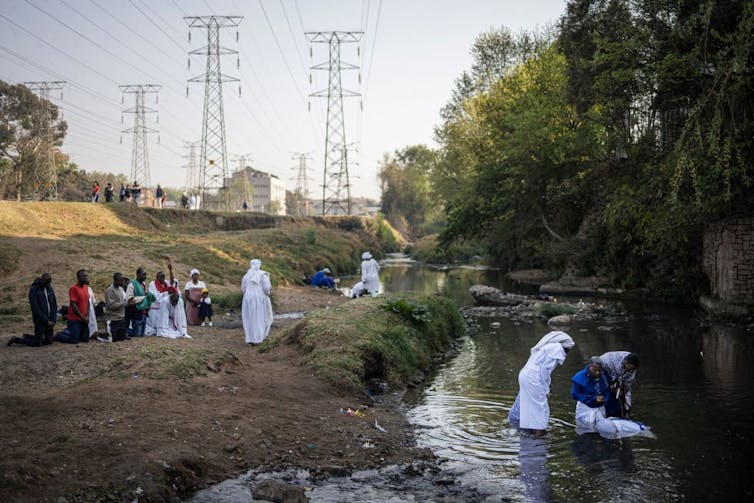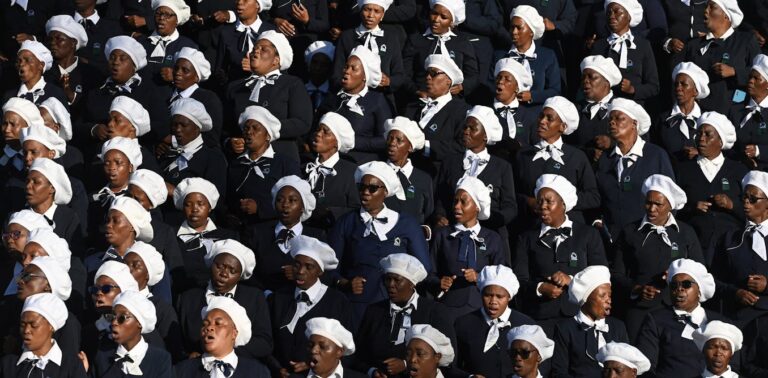Research shows South Africa is one of only three countries in the world where religious participation has increased in recent years. Her other two countries are Italy and America.
2022 Census data shows South Africa’s Christian population is on the rise again. But the growing and declining types of Christianity tell us some interesting things about the religious, cultural, social, and political sentiments of South Africans.
Only 2.9% of the population said they had no religious views at all. This means that 96.1% of South Africans profess or practice some form of faith. Although the 2022 Census was undercounted by 31% due to COVID-19 restrictions, the trend is clear.
Christianity is the most popular religion, with 85.3% of South Africans identifying as some form of Christian. Just drive through South Africa’s cities and towns and you’ll see a variety of “Christianity” on display. They range from cathedrals to in-store “miracle centers” to indigenous African communities worshiping in nature.
Although there are some similarities in their general beliefs, one would hardly be able to say what West African-style neo-Pentecostal communities have in common with, for example, Dutch Reformed church groups. . or the beliefs of the members of Zion Christian Church (ZCC). Although they may all be classified as Christians, their beliefs and practices appear to be quite different.
In South Africa, membership in so-called “mainstream” Christian churches such as Methodists, Anglicans, Catholics, and Dutch Reformed churches is steadily declining. At the same time, the country has seen a significant increase in membership of indigenous African Christian groups (such as the ZCC, the Church of John Masouwe and the Church of John Marange) and postcolonial Christian groups (such as Prosperity and neo-Pentecostal groups). is increasing.
My research as a public theologian has focused on religious, social, and political changes in Southern African Christianity for almost three decades. Understanding a country’s religious beliefs helps explain the structure of its society and also helps map how that society changes.
And the church exerts political influence. This is especially true during elections, when political leaders attend megachurches seeking votes and receiving support from church leaders.
Church leaders are also trying to shape politics. For example, some of South Africa’s fastest-growing Christian groups have threatened to “shut down South Africa” if corrupt former president Jacob Zuma and his MK party do not win the 2024 national elections. ” he promises.
It is important to understand the worldviews of South Africa’s diverse Christian churches and the potential impact that their moral and theological beliefs have on the future of the country as a whole.
colonial church
Like many things in South Africa, religious traditions have important connections to a painful and racist colonial and apartheid history. My own religious tradition, Methodism, was one of the earliest forms of colonial Christianity to reach the southern tip of Africa.
The early English, Dutch, and French Christians that came to South Africa were as committed to their cultural and political identity as they were to their religious beliefs. As historians have shown, missionaries often confused their own religious beliefs with the political and economic interests of their home countries.
This had a devastating impact on the culture, identity, and religious beliefs of African indigenous peoples. African religions were condemned as evil and even labeled as witchcraft. Local ethical systems were replaced by foreign Western ideals. Language, art, and customs were eroded and replaced with foreign symbols and customs that distanced people from history.
It is therefore not surprising to see these colonial Christian churches rejected in favor of postcolonial and African indigenous beliefs.
new church
My research points to three main reasons for the growth of these “new” churches over the past several decades.
First, there are cultural reasons. There is growing interest among both “ordinary” believers and academics in the decolonization of religious beliefs and practices.

Michelle Spatari/AFP/Getty Images
The largest proportion (40.82%) of South African Christians express an aspiration to combine African identity and African philosophical systems with their religious beliefs. They choose to participate in church communities that preach, sing, and pray in African indigenous languages and dress in culturally appropriate attire.
A notable debate is also occurring in South Africa’s largest “mainstream” Christian denomination. There is something appealing about a Methodist minister who is also a traditional healer (Uktwasa) You can practice both at the same time.
Second, there are socio-economic reasons. As South Africa’s largely young population struggles with poverty, unemployment and inadequate social provisions, attention has turned to the Church, which promises a supernatural path to wealth and social prestige.
Although these churches often have ties to the prosperity gospel of West Africa and the United States, they have long retained core elements of colonial Christianity, such as religious vestments and a liturgy that still prays for the King of England. I have abandoned it. They are dedicated to new forms of imperialism: capitalism, individual freedom, and identity politics.
Third, there are political reasons for the growth of these churches. Many South Africans find the historical association between ‘mainstream’ Christianity and political parties disappointing. In the last Congressional Census, 63% of members of Congress said they were members of the Methodist Church. The church recently posted on social media that politicians should not be “microphoned” at church services.
As South Africans lose faith in the promises of politicians, they are also losing faith in the religious communities that seem to support them uncritically.
why is this important
The history of Christianity provides insight into the hopes, dreams, setbacks, and sorrows of South Africans. This can be seen by looking at how religion has changed along social, political, and economic lines.
South Africans remain religious and are becoming increasingly religious. Some forms of Christianity they embrace are politically dangerous and economically harmful, while others promise a more authentically African faith and way of life. What people believe is important, but so is what they no longer believe.

